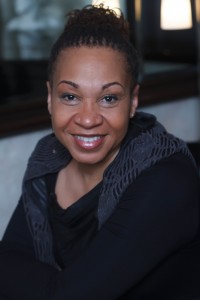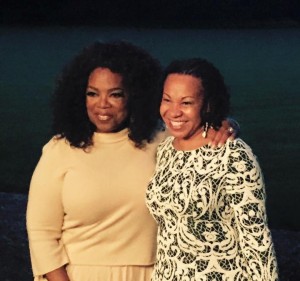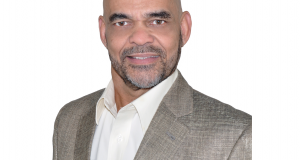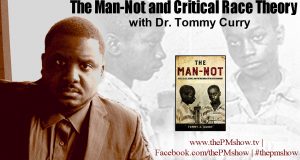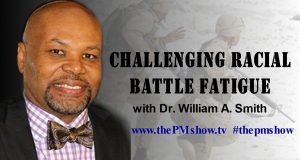
“You are hitting me in the leg and telling me I am complaining about it.”
This quote is the essence of Dr. Joy Angela DeGruy’s work on PTSS (Post Traumatic Slave Syndrome).
What if someone severely injured you, and you could not receive the medical attention to properly heal and recover because the person that injured you, kept injuring you every time you made a little progress? Not to mention, each time they re-injured you, you would scream with pain and protest while they blame you for your pain and lack of being able to recover. Then they tell you to remain calm, suck it up and don’t play the race card.
Welcome to the DAILY world of Black people who are descendants of slavery in America!
WHO IS DR. DE GRUY?
Dr. Joy DeGruy is an author, educator, researcher, and speaker who focuses on giving a voice to cultural and ethnic groups in the United States and helping them find a way out of their struggles. She has a Bachelor’s Degree in Speech Communication and a Master’s Degree in Social Work, both from Portland State University. She eventually earned a Master’s Degree in Clinical Psychology from Pacific University and a Doctorate Degree in Social Work and Social Research from Portland State University.
Over the years, Dr. DeGruy has worked different jobs in different companies. She was an associate for Willard and Associates, an associate consultant for Nichols and Associates, and a principal for JDL & Associates. She also worked as an instructor in the Portland State University School of Education as well as the Portland State University Graduate School of Social Work, and she became a trainer and social work consultant with Northwest Regional Educational Laboratory. Currently, she’s an assistant professor at the Portland State University School of Social Work and the president of Joy DeGruy Publications.
Dr. DeGruy is well-respected in the community because of her achievements, but she became well-known around the country and even around the globe because of her research on Post Traumatic Slave Syndrome or PTSS. Her books and workshops have opened people’s eyes to the challenges that African-Americans go through. Through her work, she teaches people of color on how they can turn negative behaviors, beliefs, and actions into positive ones and even shows non-African Americans how they can support friends, neighbors, and colleagues who are experiencing PTSS.
WHAT IS PTSS?
Post Traumatic Slave Syndrome is a theory that traces the epigenetics of African-American behaviors. According to the theory, many of the behaviors, beliefs, and even actions of modern African-Americans are not just brought about by contemporary racism but are also rooted in what their ancestors have gone through.
It’s not a secret that people of color have experienced a lot of hardships and unfair treatment. It all started when the first Africans were brought as slaves to America and were made to believe that they were inferior to white-skinned people. Over the years, African-Americans have been through different forms of oppression, like lynching, mass incarceration, imprisonment without fair trial, and color segregation.
Many people want to believe that the United States is “over” the unfair treatment of Africa-American people, but Dr. DeGruy’s research shows that this isn’t really the case. Aside from the fact that racism still exists in the modern world, the effects of centuries-long oppression can still be felt today. One reason for this is the maladaptive behaviors that have been passed from one generation to another and are still present in the lives of modern African-Americans.
The early African-Americans developed certain behaviors that helped them survive in their harsh environment, and they passed these down to their children who, in turn, passed them to their offspring. These beliefs and actions helped African-Americans cope with the trauma of slavery, but some of them have lost their effectiveness as centuries passed. These have turned into maladaptive behaviors, which are now preventing modern people of color from achieving their full potential and living the lives they want.
It’s important to note that these negative behaviors didn’t just stem from the struggles of African-Americans during the era of slavery. They’re also a product of all the forms of oppression and racial discrimination that people of color have experienced over the years. Dr. DeGruy calls this “multigenerational trauma”.
So how does a person with PTSS act and react to everyday situations? Each and every person manifests PTSS in his or her own way, but Dr. DeGruy points out that there are several behavioral patterns that are common in those who have the syndrome. One of these is low self-esteem, which can be accompanied with hopelessness and even depression. Other patterns include the inclination to express anger in an unhealthy way and the tendency to gravitate towards violence (either to self or to others). Many individuals with PTSS also show aversion for the traditions and physical characteristics that are associated with their own ethnic heritage, and some of them even make it a point to avoid members of their ethnic group.
PTSS perpetuates because many African-American children get exposed to maladaptive behaviors from their parents, relatives, friends, neighbors, and the entire community. Unless the cycle is broken, the syndrome will continue to be present in the next generations. What’s worse is that, as Dr. DeGruy points out, treating PTSS isn’t as simple as giving someone medications. It requires a long, painstaking process for the individual to identify the negative behaviors that are ingrained in his personality and replacing them with positive ones that will promote and sustain his healing.
However, the fact that it’s difficult doesn’t mean it’s impossible. Dr. DeGruy uses her books and workshops to bring healing to many African-Americans, and she has already helped hundreds of people overcome PTSS through her efforts.
HOW CAN I LEARN MORE?
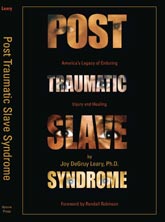 PTSS affects many African-Americans, but it’s important to note that they’re not the only ones who experience its effects. The entire society suffers from the debilitating consequences of PTSS, so it’s the responsibility of every American to help solve this syndrome.
PTSS affects many African-Americans, but it’s important to note that they’re not the only ones who experience its effects. The entire society suffers from the debilitating consequences of PTSS, so it’s the responsibility of every American to help solve this syndrome.
If you’re interested to help, one of the best ways to start is to learn more about Post Traumatic Slave Syndrome. You can do this by:
Reading Dr. DeGruy’s Books
As mentioned above, Dr. Joy DeGruy has written a couple of books about PTSS. One of these is Post Traumatic Slave Syndrome: America’s Legacy of Enduring Injury and Healing, which reflects her research in Africa and America as well as her years of experience as a social worker. In this book, Dr. DeGruy discusses slavery, racism, and other challenges that African-Americans have had to face over the decades. She also talks about the adaptive behaviors that many people of color have developed as a way to survive and even thrive in dire situations. In the final chapters, she tackles how African-Americans can separate the positive behaviors from the negative ones and learn to replace the latter with beliefs and actions that will allow them to experience healing.
Aside from reading the book, you can also get The Study Guide. It’s packed with tips, tools, and resources that will help you, your group, or your organization gain a deeper understanding of PTSS. Through the guide, you’ll learn how to develop the right skills that will be helpful in turning negative attitudes into positive behavior.
You can supplement your readings with the Post Traumatic Slave Syndrome CD and the Post Traumatic Slave Syndrome DVD, both of which are recordings of a talk that was given by Dr. Joy DeGruy in New York. Dr. DeGruy discussed the problems that African-Americans have faced over the years, from slavery to black codes to modern racism.
The books, CD, and DVD are all available on Dr. DeGruy’s website. Post Traumatic Slave Syndrome: America’s Legacy of Enduring Injury and Healing is offered both as a print copy and an eBook.
Attending Dr. DeGruy’s Workshops
It’s one thing to read Dr. DeGruy’s books, listen to her through her CD, and watch her DVD. It’s another thing to see and hear her in person. If you want to have the experience of meting Dr. Joy DeGruy, you can easily do so by attending her workshops. During these events, you won’t only listen to her talk about PTSS and other issues that African-Americans face, but you’ll also get the opportunity to ask her questions. As an added bonus, you’ll have the chance to meet and interact with other people who are concerned about PTSS or are also suffering from it.
Here are the workshops that you can attend:
• Post Traumatic Slave Syndrome
It covers the points that have been discussed in the book and the study guide. It’s a good choice whether you’ve already read the book and just want to gain additional pointers or if you haven’t yet read the book but want to learn about the topics it discusses.
• Healing Workshops
Reading tips and advice about how to heal yourself can be helpful. However, you can’t deny that it’s always better to speak face to face with someone who can guide you through the path of healing. This is one of the reasons why you should attend the series of healing workshops that are organized by Dr. DeGruy. During these events, Dr. DeGruy will share her strategies for achieving complete healing while encouraging you to come up with your own techniques that are ideal for your personality and background. She will also inspire you to conquer your fears and become an active participant in achieving social justice for all.
• African American Male Adolescent Violence
This workshop is great for African-American parents whose sons are entering the adolescent stage as well as for teachers, guidace counselors, and other people who regularly interact with African-American youth. Through these workshops, you’ll learn about the historical and modern factors that put a lot of stress on economically disadvantaged African-American male teenagers, who aren’t just perpetrators of violence but oftentimes are also victims of it.
• Culture Specific Models Of Service Delivery & Practice
This seminar is designed for teachers, counselors, physicians, social workers, and other people who are in the position to assist people who come from different ethnic and cultural groups. By attending this seminar, you’ll know about the importance of learning the values, customs, and traditions of other people when interacting with them. You’ll also find out how you can use these factors to create a successful interaction with your clients, students, patients, or customers and provide them with the support they need.
Following her blog
Dr. Joy DeGruy has a blog on her website, and it in you can read her thoughts on almost everything, from Fourth of July celebrations to dying dragonflies. Her writings give you an insight about the things that Dr. DeGruy finds fascinating and the issues that she strongly supports while providing you with thought-provoking ideas that will make you stop and ponder.
Signing up for her course
Granted, this is applicable only for those who are studying at Portland State University, which is where Dr. DeGruy teaches. But, if you happen to be enrolled in PSU, grab the chance to register for the PTSS course. By doing so, you’ll gain a deeper understanding of African American Multigenerational trauma as well as the issues of violence that many people of color face. You’ll also learn about culturally appropriate interventions and develop the right skills to assist other individuals, families, organizations, and even entire communities in recovering from PTSS.
The course requires the Post Traumatic Slave Syndrome: America’s Legacy of Enduring Injury and Healing and The Study Guide so, if you’ve already read them, you’re already one step ahead. Aside from readings, the class also involves interactive lectures, film viewings, class discussions, small group discussions, student presentations, and other types of techniques to maximize learning.
FINAL NOTE
Dr. Joy DeGruy has shown people that the war against African-American oppression isn’t over. Though slavery and racial segregation have ended many years ago, their effects can still be felt today and have even become more powerful since they’re combined with modern issues that affect people of color. These might seem depressing, but Dr. DeGruy demonstrates that all is not hopeless since there are ways to rise above multigenerational trauma and ultimately achieve healing.
Website
Youtube
Facebook
Twitter
Google+
LinkedIn
The Philippe Matthews Show (Recurring) Programming Donation
If you enjoy the content featured on our Blog, Radio and Live Video show, please give a one-time donation or recurring donation to help with further research, production and show topics.

 Philippe Matthews Show Guru Advice, Author Reviews, Tech Reviews, Entertainment News
Philippe Matthews Show Guru Advice, Author Reviews, Tech Reviews, Entertainment News


